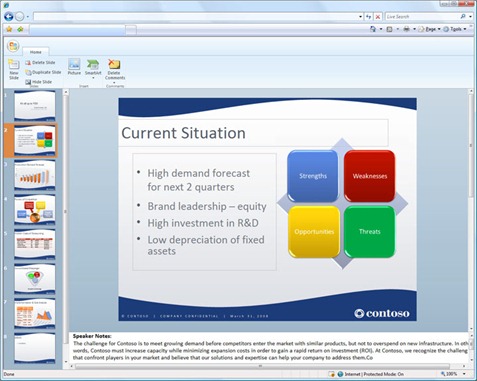At Wordwide Partner Conference in New Orleans, Microsoft announced the technical preview of Microsoft Office 2010. Concurrently, Microsoft also revealed more details about Office Web Apps. The apps are lightweight, browser-based versions of Word, Excel, PowerPoint and OneNote.
The web apps will be hosted on Windows Live (that is available to anyone with a Windows Live account) and will be available for free. The online storage will be managed through SkyDrive. However, few functions will be available only if Microsoft Silverlight is installed. The good news being that Silverlight is not required to run most of the features of the web applications – it is to enhance the user experience for sharper images and better rendering. The web-based applications are designed to work on any browser (Firefox, Safari, IE) plus on most mobile browsers. It doesn’t matter which Operating System is used if you have the right browser. Another great attraction for enterprises is that they can host Web Apps on their own servers on top of SharePoint! meaning no compromise on security. The educational institutions will get the apps for free, students will get Office Web applications through Office Live Workspace and universities will get it through the free Live@edu service.
The eye-catching point was that Google Chrome is missing in the browser’s list. Stephen Elop (the head of Microsoft’s Business Division), however, explains the absence in an interview as follows :
From a market share perspective Chrome is very low. So I think we’re driven by customers on these things. There are other browsers that have greater market share, and that’s where we’ve concentrated our first efforts.
Good news for the iPhone users: The Web Office suite will work with the Apple iPhone and its mobile Safari web browser with Silverlight not being a pre-requisite.
To know more, check out the video below:
It is said that a private technology preview of the Office Web applications will be available later this year. However, the official public release date for beta is speculated to be some time in late 2009.
The question arises whether this will give a tough competition to Google “office” Apps or more specifically Google Docs?
Lets see: Microsoft has the most popular Word processor out there, better excel sheets to work with plus the experience on the Web apps will be the same as the one on your desktop. On the other hand, Google takes the lead in real time collaboration through which users can access their documents without internet connectivity. It also allows to share presentations through your browser to anyone in the world with a Google account.
Since both companies are offering their Office Web products for free! The question is which web service will you prefer? Will you go for the familiar and popular Ribbon-like interface Office on the web or the more simple and basic looking Google solution?

